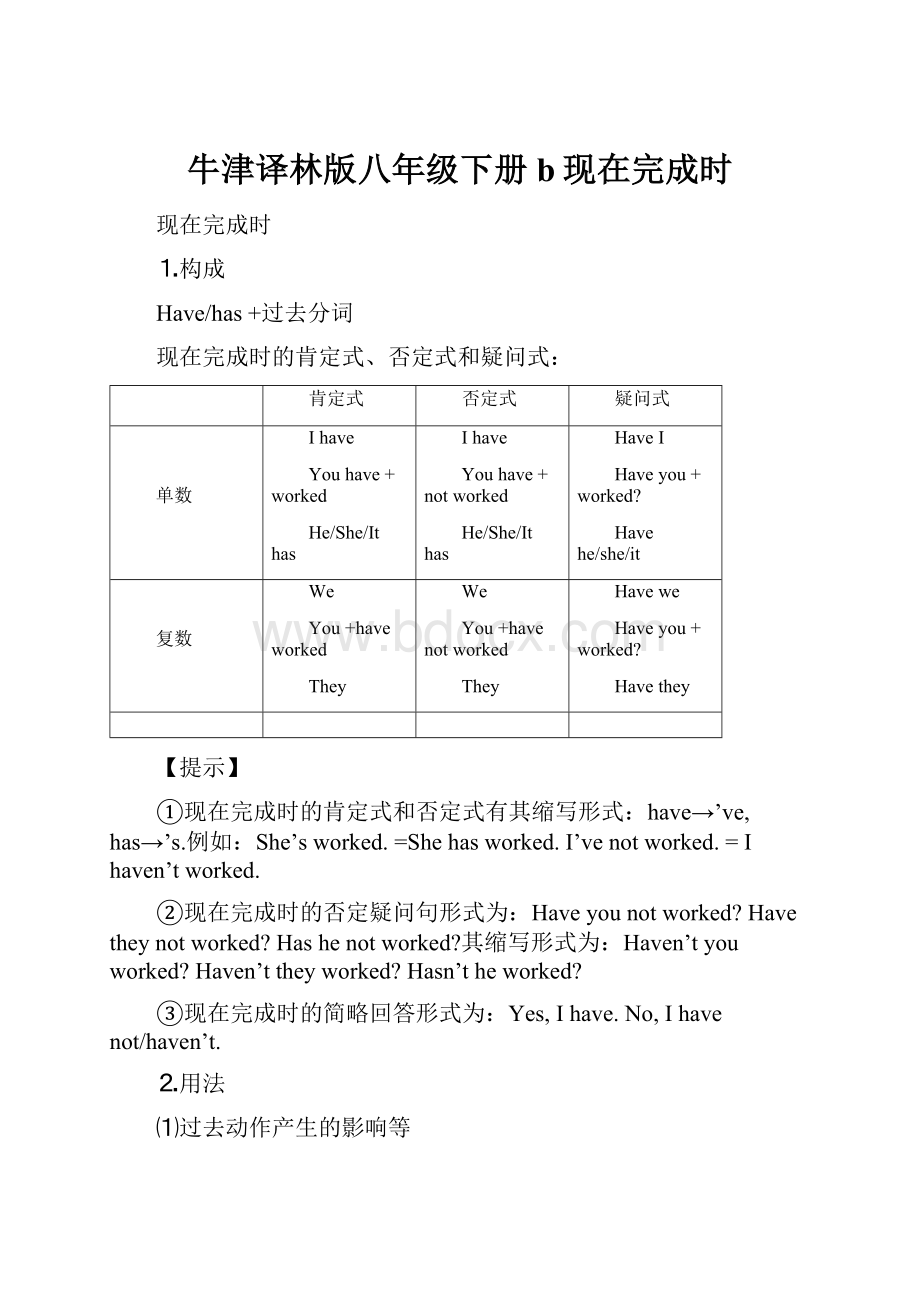牛津译林版八年级下册b现在完成时.docx
《牛津译林版八年级下册b现在完成时.docx》由会员分享,可在线阅读,更多相关《牛津译林版八年级下册b现在完成时.docx(11页珍藏版)》请在冰豆网上搜索。

牛津译林版八年级下册b现在完成时
现在完成时
⒈构成
Have/has+过去分词
现在完成时的肯定式、否定式和疑问式:
肯定式
否定式
疑问式
单数
Ihave
Youhave+worked
He/She/Ithas
Ihave
Youhave+notworked
He/She/Ithas
HaveI
Haveyou+worked?
Havehe/she/it
复数
We
You+haveworked
They
We
You+havenotworked
They
Havewe
Haveyou+worked?
Havethey
【提示】
①现在完成时的肯定式和否定式有其缩写形式:
have→’ve,has→’s.例如:
She’sworked.=Shehasworked.I’venotworked.=Ihaven’tworked.
②现在完成时的否定疑问句形式为:
Haveyounotworked?
Havetheynotworked?
Hashenotworked?
其缩写形式为:
Haven’tyouworked?
Haven’ttheyworked?
Hasn’theworked?
③现在完成时的简略回答形式为:
Yes,Ihave.No,Ihavenot/haven’t.
⒉用法
⑴过去动作产生的影响等
表示过去发生的某一动作对现在造成的影响或产生的结果。
在没有具体时间状语的情况下,现在完成时可以表示某一行为动作在说话之前已经完成,而其结果或影响至今仍然存在。
因此,现在完车时这一时态强调的是过去的动作同现在的联系,也就是强调现在的影响和结果。
例如:
Someonehasbrokenthewindow.(“打破”这一动作虽然发生在过去,但影响延续至今,其结果是窗子仍然是破的,Thewindowisnowbroken.)
Ihavelostmypen.(结果是:
我现在无钢笔可用,Ihavenopentouse.)
He’slockedthedoor.(结果是:
现在门锁上了,我们进不去,Nowthedoorislockedandwecan’tgoin.)
Thepartyhasstarted.(Thepartystartedandnowitisgoingon.)
I’veforgottenhername=Iforgothername.
他今天还没吃任何东西.(现在一定很饿了)
_________________________________________________________________
我已经吃过午饭了(现在不饿了)
____________________________________________________
⑵过去的动作延续到现在和未来
表示一个开始于过去,持续到现在,并可能继续下去的动作或状态,常同for,since引导的时间状语连用,或用于Howlong…(多久)句型中,表示持续的时间。
例如:
HehasstudiedEnglishfortenyears.(可能继续学下去)
Shehaslivedheresincethen.
HehasbeeninNanjingsince2003.
MissLinhasworkedinthefactorysinceshecametothecity.
你已经住在这个房子里多久了?
_____________________________________________________
这个女孩已经病了一个星期了。
______________________________________________________
【提示】for是介词,后面只能跟单词或词组;since是介词或连词,后面可以跟单词、词组或句子。
⑶同recently等状语连用
现在完成时常同表示从过去某时刻延续到现在并包括现在在内的一段时间状语连用,如recently,today,thismorning,thisweek,lately,uptonow,sofar,inthepast/lastfewmonths,sincethreeyearsago等。
例如:
Ihaven’tseenhimthisweek.
Ihavebeenbusythismorning.
Hehasboughtanewbikerecently.
⑷同often等状语连用
现在完成时常同不明确指出具体时间的状语连用,如often,already,yet,never,ever,always,once,twice,sometimes,just,foralongtime,onlytwice等。
例如:
Haveyoudoneyourhomeworkyet?
我们已经完成了工作。
__________________________________
我从没去过英国。
_______________________________________
⑸将来某时已经完成的动作
现在完成时可以用在条件或时间状语从句中,表示将来某个时刻之前已经完成的动作。
例如:
Hewillcomeassoonashehasfinishedthehomework.
IfyouhavereadthebookbeforeIleave,pleaselendittome.
Weshallwaithereuntiltherainhasstopped.
⑹havegone和havebeen
havegone和havebeen意义上不同,前者表示“到某地去了,尚没回来,现在不在这里”,后者表示“曾经到过某地,现在已返回”。
比较:
ShehasgonetoBeijing.(她现在不在这里,去北京了,可能已经到达,也可能仍在途中)
ShehasbeentoBeijing.(她以前到过北京,现在已不在北京了)
Wherehashebeen?
(他已回来)
Wherehashegone?
(他现在不在这里)
比较:
havebeentodosth做过了某事
havegonetodosth去做某事了
havecometodosth来做某事了
⑺for2004还是since2004
英语中有些动词表示的动作是一时性的、短暂的、不能延续的,所以,不能同for和since等引导的表示一段时间的状语连用,也不可用于“Howlong/Howmany+时间名词”句中。
因此,这类动词可以单独使用于完成时中,但不可同表示一段时间的状语一起用于完成时中,包括现在完成时和过去完成时。
这类动词有:
go,come,leave,arrive,join,receive,get,die,buy,borrow,choose,close,fall,finish,kill,lend,marry,open,reach,return,start,stop,sitdown,standup等。
比较:
HowlongmayIkeepthebook?
Hergrandmotherhasbeendeadforfivemonths.
Itisfivemonthssincehergrandfatherdied.
Hehasarrived.
Hearrivedtherethreehoursago.
It’sthreehourssincehearrived.
Ithasbeenthreehourssincehearrived.
HehasbeenawayfromShanghaifortwoweeks.
ItistwoweekssinceheleftShanghai.
HehasleftShanghai.
Shehasjoinedthearmy.
Shehasbeeninthearmysince20004.
Itisthreeyearssinceshejoinedthearmy.
【提示】①非延续性动词的完成时有时可以同for引导的短语连用,但表示的是某一动作的目的或结果,而不是表示动作本身延续的时间。
例如:
Shehascomefortwoweeks.她已经来了,准备住两个星期。
Hehasgoneforthreedays.他走了,要在三天后回来。
②非延续性动词的否定式表示动作的持续过程,具有延续性,因此可以同for或since引导的一段时间状语连用。
例如:
Ihaven’treceivedherletterforawholeyear.
Hehasn’tboughtanybooksincelastmonth.
for/since的特殊注意:
在带有for或since短语或since从句的句子中以及Howlong提问的句子中,谓语动词只
用延续性动词(可持续一段时间的动作),而不能用短暂性动词(在瞬间发生完毕的动作)
常见的短暂性动词与延续性动词的转换
borrow/lendhave(has)kept
buyhave(has)had/owned
diehave(has)beendead
begin/starthave(has)beenon
finishhave(has)beenover
openhave(has)beenopen
closehave(has)beenclosed
catchacoldhave(has)hadacold
fallillhave(has)beenill
fallasleephave(has)beenill
becomehave(has)been
leavehave(has)beenawayfrom
getmarriedhave(has)beenmarried
joinhave(has)beenamemberof
have(has)beenin
move/come/gotohave(has)beenin/at
⑻现在完成时和一般过去时的比较
①现在完成时不可与表示特定过去时间的副词连用,如ago,then,yesterday等,但一般过去时可以。
例如:
Heworkedherelastyear.
2现在完成时强调过去的动作对现在的影响或产生的结果,而一般过去时只限于表示过去的动作本身,与现在的结果无关。
例如:
Hehasbeenillforaweek.(现在仍然病着)
Hewasillforaweek.(过去病过一个星期,现在好了)
Hehasboughtahouse(现在完成时,到说话时仍然拥有那所房子)
Heboughtahousefiveyearsago(一般过去时只说明他五年前买过一所房子,现在不一定还拥有那所房子)
Ihaven’twrittenhimforages.(现在仍没有写)
Ididn’twritehimforages(仅指过去)
③现在完成时可以同现在在内的时间状语连用;而一般过去时则不可。
例如:
Ithasbeenhotthissummer.(说话时仍然是夏天)
Itwashotthissummer.(说话时夏天已经过去)
4现在完成时不可与疑问副词when连用;而一般过去时则可以。
例如:
Whendidhecome?
⑼already和yet的区别
already用于肯定句,yet用于否定句和疑问句;already有时也可用于疑问句,表示“惊讶,意外”的意思。
例如:
Hurryup,wearealreadytwentyminuteslate.
Ihaven’theardfromhimyet.
Hasclassbegunyet?
Hasclassbegunalready?
(想不到)
Haveyousoldthecaryet?
Haveyousoldthecaralready?
(惊讶)
【补充】
ago和before的用法
ago是副词,表示从现在算起的若干时间以前,用于“名词词组+ago”结构;ago所在句中的谓语动词用一般过去时;ago不可单独使用,也不可用作连词。
before作副词用时,表示从过去某一时刻或某一事件算起的若干时间以前,所在句中的谓语动词用过去去完成时;before还可以单独使用,意为“以前”,谓语动词用现在完成时,ago则没有这种用法;before还可以用作连词,后接单词、词组或句子,ago则没有这种用法。
比较:
Shesawthefilmthreedaysago.(从现在说起三天前)
Shetoldmethatshehadseenthefilmthreedaysbefore.(从过去说起三天前)
Ihaveseenherbefore.
Shehadleftbeforehearrived.
※课堂训练:
一、用所给动词的正确形式填空。
1.I______already_________(see)thefilm.I________(see)itlastweek.
2.__________he_________(finish)hisworktoday?
Notyet.
3.Myfather_________just________(come)backfromwork.Heistirednow.
4.Where’sLiMing?
He__________(go)totheteacher’soffice.
5.I__________(work)heresinceI______(move)herein1999.
6.SofarI_______________(make)quiteafewfriendshere.
7.Howlong________theWangs______________(stay)here?
Fortwoweeks.
8.I________just___________(finish)myhomework.
9.He________(go)toschoolonfooteveryday.
10.____you______(find)yoursciencebookyet?
11.Ifit____(be)finetomorrow,I'llgowithyou.
12.Thestudents____________(read)Englishwhentheteachercamein.
13.Look!
Themonkey__________(climb)thetree.
14.Mymother__________(come)toseemenextSunday.
15.I'velostmypen._________you________(see)itanywhere?
二、单项选择
()1.Howlonghaveyou_______here?
A.comeB.gotC.arrivedD.been
()2.Mygrandpadied_________.
A.attheageofmy2B.for2yearsC.whenIwas2.D.myagewas6.
()3.Janehas_____toBeiJing.Shewillcomebacktomorrow.
A.beenB.goneC.wentD.neverbeen
()4.Itistenyears_____Ilastsawher.
A.afterB.sinceC.forD.that
()5.--WhowillgotothestationtomeetLorry?
--Iwill.I_____herseveraltimes.
A.metB.havemetC.hadmetD.willmeet
()6.--Whatanicedress!
Howlong_____you_____it?
--Just2weeks.
A.will,buyB.did,buyC.are,havingD.have,had
()7.--DoyouknowLydiaverywell?
--Yes,SheandI_____friendssincewewereveryyoung.
A.havemadeB.havebecomeC.havebeenD.haveturned
()8.TheSmiths_______inChinafor8years.
A.haslivedB.livedC.havebeenD.live
()9.--Hello,thisisMr.Greenspeaking.CanIspeaktoMr.Black?
--Sorry.He______theBainiaoPark.
A.hasbeentoB.hasgonetoC.wenttoD.willgoto
()10.--____youever____totheUS?
--Yes,twice.
A.Have,goneB.Have,beenC,Do,goD.were,going
三、句型转换
IhavebeentoMacaubefore.(改为否定句)
I__________________beentoMacaubefore.
Hehasn’tcometoschoolbecausehewasill.(就划线部分提问)
_____________hecometoschool?
Iboughanewbikejustnow.(用just改写)
I____just____anewbike.
WebegantolearnEnglishthreeyearsago.(改为同义句)
We________English____threeyears
5.Hehasneversurfed,______________?
(改成反意疑问句)
6.Theyhavebeenheresince2000.(对划线部分提问)
______________havetheybeenhere?
Theoldman_________lastyear.
Hehas______________forayear.(die)(动词填空)
MissGaoleftanhourago.(同义句转换)
MissGaohas_______________________anhourago.
※课后作业
一、用have/hasbeento/in,havegoneto及go的各种形式填空。
1)WhereisJack?
He_________________hiscountry.
2)David________________theparkjustnow.
3)John__________________Englandsincehecameback.
4)Howlong_____they_____thisvillage?
5)TheSmiths_____________________Beijingforyears.
6)_____youever____America?
--Yes,I______________theremanytimes.
7)I_______________thisschoolsincethreeyearsago.
8)WhereisJim?
He_______________________thefarm.
9)When_____he_____?
He__________anhourago.
10)Wouldyouliketo_______________tothezoowithme?
---Yes,butI_____therebefore.
11)Where_____you_____now?
---I_______________tothezoo.
12)Heoften_____________swimming.
13)_____you______therelastyear?
14)_____theyoften______skatinginwinter?
二、用never,ever,already,just,yet,for,since填空
1.Ihave_______seenhimbefore,soIhavenoideaabouthim.
2.Jackhas_________finishedhishomework.
3.Mr.Wanghastaughtinthisschool________tenyears.
4.“Haveyou________seenthefilm?
”“No,Ihave________seenit.”
5.“Hasthebusleft_______?
”“Yes,ithas_________left.”